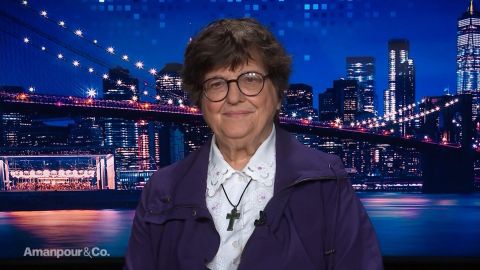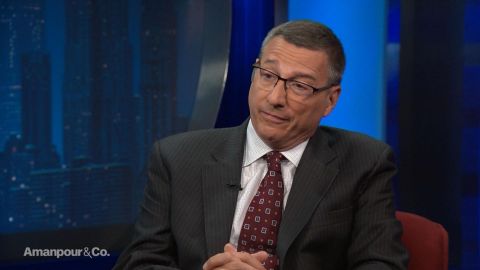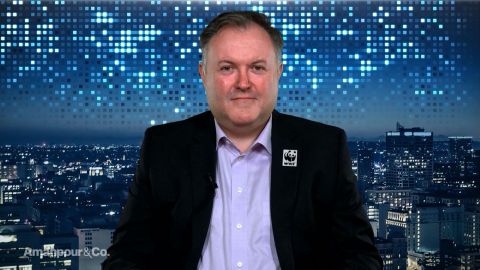Read Transcript EXPAND
CHRISTIANE AMANPOUR: The power of words also plays a central role in our next guest’s story. Reverend Rob Schenck was a prominent figure in one of the most aggressive corners of America’s anti-abortion movement, that is until he realized that his harmful rhetoric calling abortion doctors monsters and murderers may have motivated the fatal shooting of Dr. Barnett Slepian in 1998.
After years of soul searching and a string of hate crimes in the United States, Schenck has written a piece for “Time” magazine titled “My Words Led to Violence. Now Trump’s Are Too.” And he told Michel Martin how he realized that rhetoric has real world consequences.
(BEGIN VIDEO TAPE)
MICHEL MARTIN, CONTRIBUTOR: For people who don’t know your story, you became very active in the so-called pro-life movement, the movement to curtail abortion rights in this country. Can you just tell us what drew you to it?
REV. ROB SCHENCK, EVANGELICAL MINISTER: I spent 30 years as what we then called a pro-life activist and that included mobilizing very large numbers of people to blockade clinics and other facilities where you could find abortion services and that included rallies at those locations, and I often took the stage as a representative of one group or another. And those rallies could get pretty energetic, and, you know, even a preacher can find the response of a crowd very appealing.
MARTIN: Well, let’s talk about what you actually and like what some of your tactics [13:20:00] were.
SCHENCK: Sure.
MARTIN: You know, you wrote about it in your piece for “Time,” I mean, you said that you depicted doctors who performed abortions as murderers, callous profiteers and misery, monsters and even pigs. I mean, did you actually say those words?
SCHENCK: I did.
MARTIN: You called them pigs?
SCHENCK: I did. Yes, I did use those terms. And the whole idea was to kind of cast these people in what we use to term in the abortion industry as very ugly and nefarious actors. And even, though I wouldn’t have admitted it to the time, dehumanize them, make them something other than human beings.
MARTIN: You know, the core of your message was supposed to be the dignity of all life, the dignity of list (ph) of this. Did you honestly not see
any contradiction between your dehumanizing doctors and abortion clinic workers and the core of your message?
SCHENCK: I had to convince myself that I was right. I did have doubts. There were moments in the quiet of my head when I was going to sleep at night where I would rehearse the events of the day, the words I had spoken, the people I had attacked verbally from a stage and I would worry about it. I would take pause to think about it. Sometimes that was very difficult.
But, you know, certitude was a necessary component of what I was doing. Without it, there was the chance that I would have to admit that I was wrong and I wasn’t in a position to do that. So, it was almost like I had to — I got carried away. And eventually, I had to just dismiss those thoughts, categorically.
MARTIN: Can I just ask? And was there anybody in your life who said, “Hey, you know what, this isn’t –”
SCHENCK: Yes.
MARTIN: And you —
SCHENCK: Yes. There was a very loving wife. I happened to be married to a psychotherapist. So, she had some challenges to offer to me. I wish I would have listened to her. My children. There were colleagues who said to me, Schenck, I think you’re off base here. You may even be comprising the message we all try to convey, which is the gospel when Jesus was asked what is the greatest of all the commandments, he answered there are two, love your God and love your neighbor as yourself. You are not loving your neighbor.”
MARTIN: And when they would say this to you, you would say what?
SCHENCK: I would have to classify them as weaklings, as cowards who were more concerned with being of politically correct, with being socially acceptable, maybe looking for what we called the praise of man rather than the praise of God, and the people eventually replaced God for me.
I needed audience approval much more than I needed God’s approval. And I had an ever increasing audience that gave me that approval.
MARTIN: And then Dr. Slepian was killed.
SCHENCK: Yes.
MARTIN: Dr. Barnett Slepian was killed in 1998. For people that don’t recall, he was a practitioner of abortions at —
SCHENCK: Yes.
MARTIN: — a clinic in Buffalo. He was one of the targets of your activism.
SCHENCK: Yes.
MARTIN: And he was murdered.
SCHENCK: We knew him as what we termed very pejoratively an abortionist. But most people — and we now know — knew him as an OB-GYN, a beloved OB- GYN, who delivered their children, who took care of women and moms and sisters and aunts. And he was not shy to come out and confront us, which he did on a number of occasions.
And so, you know, there would be an exchange. And on a few occasions, that was literally face to face between him and me. Our group traveled to his home. I harassed him and his family in their own driveway. I look back at those things in the moment when he was killed, it’s kind of one of those things where a lot of scenes flash in front of your eyes and I felt momentary regret, but I had to quickly compartmentalize that and put it aside because the implications were too great for me personally.
MARTIN: You put roses at this office. I remember you took, what, like seven roses, like one for him, one for his wife, one for his children, his four children, and one for, what you said, was hope. And his widow basically told you, pardon my language, to go to hell.
SCHENCK: She did, indeed.
MARTIN: She said, you know, “You did this. And you should be accountable for that.” Now, you didn’t pull the trigger, to be clear. But somebody you feel inspired by your rhetoric took it upon himself to go kill him in his house where you had been demonstrating. So, everybody knew where it was. How did you take that when she said, “You know what, Reverend, you did this”?
SCHENCK: It was very, very difficult to read that. She wrote it to me in a note. Returned the flowers, crushed. And today, I realize that was not just appropriate, it was necessary and I deserved it. Back then I took a deep gulp, swallowed hard, convinced myself she didn’t understand my true intentions. And what about my business? I had convinced myself no one in our movement would ever do such a thing. Would ever pick up a gun and kill a man, particularly in view of his children. It was an unthinkable event.
When it happened, I convinced myself that it must have been someone very far on periphery, probably an invader, maybe even somebody who was setting us up in some way to discredit our movement. And then someone sent me a photo of the perpetrator standing in the frame of a news conference that we had held. I didn’t know his name at the time, but there he was. Not on the periphery, but standing very close to the leaders of our movement.
And that told me something is deeply wrong here. But it would take me years to face it and address it. And, frankly, I’ll be candid, only in therapy myself could I do that.
MARTIN: What was it that made you finally see a connection between the violence of your words and the violent actions of one of your followers?
What was it? Was there a moment of epiphany?
SCHENCK: You know, it was a process for me. And it started in moral and spiritual reflection. Continued in professional therapy, lots of conversations with my wife, later with my children. The real moment came when I sat with an unlikely friend, a pro-choice activist on a grand scale, filmmaker, Abigail Disney, who invited me to be the subject of a documentary film actually examining my evangelical community’s embrace of popular gun culture.
And as a result of that project with her — I was very reluctant to say yes. I eventually did. And then over a period of about a year, we forged a very unlikely friendship. The filmmaker, Abi Disney, told me her own personal story of abortion, which she has spoken publicly about. And by then, there was a level of trust and a rapport that we had and a conversation I had never had, prochoice people were of a different species than the people I kept company with.
I had convinced myself that pro-choice people were morally defective, that they weren’t worthy of the same respect that a pro-life person deserved.
But all that was undone in my friendship with Abi Disney.
And the more we talked about this, the more I was forced to look at myself more than I looked at her or looked at my opponents. And when I did, that was the moment of truth.
You know, the Bible even talks about when, you know, the need for us to look in the mirror and consider what sort of person we are. To linger there for a little while. Don’t just walk away and forget what you saw.
And I took that on as a personal challenge and it lead to what I call another conversion in my life. This time, it wasn’t as instantaneous the first one was.
MARTIN: I don’t want to gloss past the fact that throughout our conversation, there’s been like a tear at the corner of your eye. And I just wondered is it that — isn’t thinking about these things, the things that you said, the things that you did, I mean, you know, throwing fetuses at people. Does that still hurt all these years later to think about it?
SHENCK: You know, it’s a whole range of emotions, certainly, it makes me sad. Very sad at times. Very regretful because, you know, for me now I think the greatest gift that God has ever given to the universe is humanity.
We’re all human. Every one. We’re all in the same family.
We all deserve the same dignity, the same respect. We’re all made of the same material.
And when I think back to contributing in any way to the diminishment of someone’s humanity, to the point where his life was taken in the ultimate act of contempt and in that his own children and his wife witnessed that is an enormous source of pain. It’s selfish to even say it because I didn’t lose anything there except my own dignity, by the words that I used.
MARTIN: I wonder if your acknowledgment of this brings any comfort to the family.
SHENCK: My greatest concern in all of this public discussion has been that I may in fact inflict more injury on them by bringing up what had to be the most painful moment in their lives. And so I was really hesitant to even engage in the public discussion about it. I certainly made no attempt to communicate with the family because I think it would only add more agony.
MARTIN: But you felt you needed to speak out. In fact, your column for “Time Magazine” was very much directed at President Trump saying your words have force.
SHENCK: I know all too personally that this is not ridiculous, that there is a connection between words and what might be unintended, perhaps intentional, consequences of those words. I think the president needs to learn the same lesson that I learned and that is that you can never know the ears that your words are falling on.
Many of those people want to hear permission from a big and powerful figure on a stage and there’s no one with a larger or more powerful stage than the president of the United States. And what they are hearing, whether he knows it or not, whether he intends it or not, is a permission to act on their most hideous impulses.
And when you dehumanize someone, you devalue them to the point where, in fact, they are an animal to be hunted. Someone will go out and hunt them and kill them.
We have already seen that happen. We will see it again, and again and again. Until the president stops dehumanizing and degrading human beings with his language, as long as he does that, I can guarantee him that there are those out there waiting for that permission to unleash their murderous impulses.
So we’re in for more of this. And the only thing he can do — I could not take back my words. Very regrettably, I could never take back the words that I released from those stages but I could stop and I did.
And the president cannot take back his words but he can stop literally giving ammunition to those who will act on those words.
MARTIN: One of the things that I think is puzzling for many people in this country are the fact that white evangelicals continue to support him as a group but not just continue to support him, they’re among his strongest supporters. What do you say to that? Like how do you understand that?
SHENCK: I think we’ve made a deal with the devil, and I say that quite emphatically as a preacher. What we’ve sold our principles for political gain.
In one way, we’ve kind of traded one form of respect for human life, for a degrading of human life. So if you say, for example, well, we embraced this president because he will eventually give us the court that will end abortion in this country.
But if, in fact, he’s contributing to the suffering of those children as they grow older, and there are many ways he’s done that by trimming all kinds of social support systems for those children, how is that pro-life? That contradicts the pro-life ethic. All of this, to me, comes Down to a bid for political power.
MARTIN: I’ve seen you make this argument in groups of those who share the commitment. I’ve seen you talk to other pastors about this, who are otherwise like-minded.
And I’ve seen a lot of them basically tell you to go to hell. I mean, they said you’re an idiot or you’re arrogant or who do you think you are or why do you think your judgment supersedes that of all of us?
SHENCK: I would like to answer them in the words of Jesus, who said you shall know a man by his fruit. You look at what a person’s life produces.
When I look at my life of activism produced, I don’t think it’s fruit that anyone would want to eat. There was contempt, there was pain, there was fear, there was certainly a dismissal of the complexities of people’s lies and there was worse.
People were being shot and killed. That’s enough to say maybe we were wrong.
MARTIN: Reverend Shenck, thank you so much for talking with us.
SHENCK: Thank you.
About This Episode EXPAND
Sister Helen Prejean joins Christiane Amanpour to discuss her activism fighting the death penalty. Former anti-abortion leader Reverend Rob Schenk sits down with Michel Martin to explain how inflammatory rhetoric can turn deadly. Correspondent Jomana Karadsheh reports on the poaching of cheetahs in Somaliland. Crawford Allan joins the program to elaborate on the illegal trade of exotic animals.
LEARN MORE


